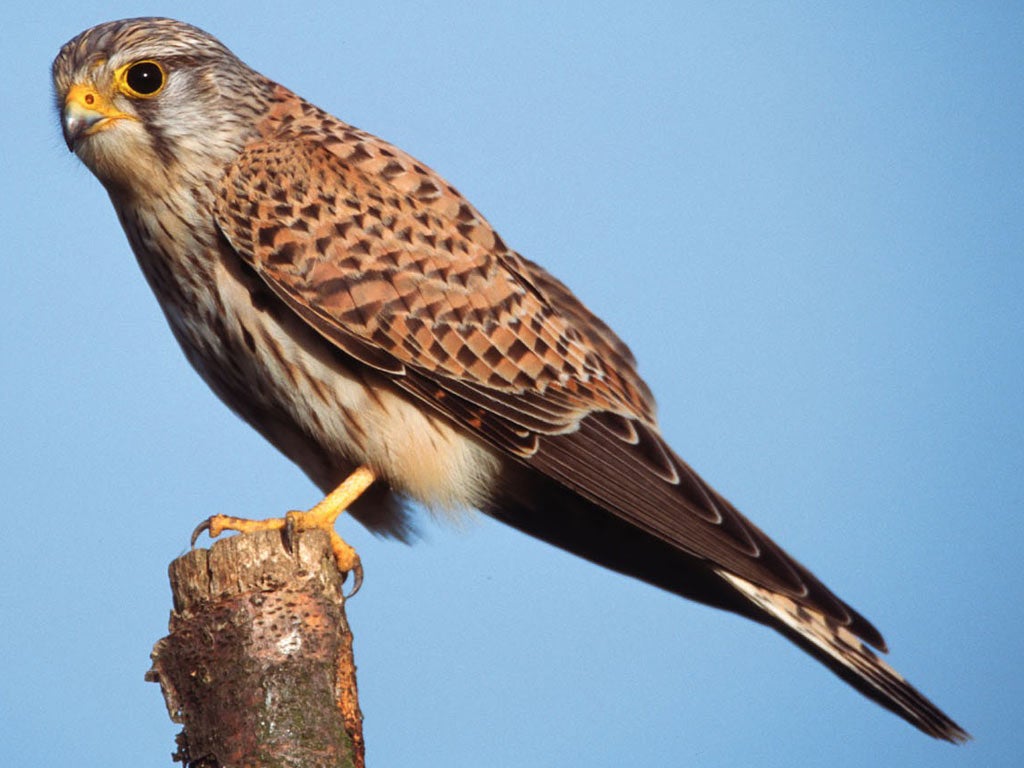What is behind the catastrophic decline of our hovering raptor?
It used to be that buzzards and falcons were struggling, while kestrels flourished. Now the situation has reversed and this proud bird faces extinction

Your support helps us to tell the story
From reproductive rights to climate change to Big Tech, The Independent is on the ground when the story is developing. Whether it's investigating the financials of Elon Musk's pro-Trump PAC or producing our latest documentary, 'The A Word', which shines a light on the American women fighting for reproductive rights, we know how important it is to parse out the facts from the messaging.
At such a critical moment in US history, we need reporters on the ground. Your donation allows us to keep sending journalists to speak to both sides of the story.
The Independent is trusted by Americans across the entire political spectrum. And unlike many other quality news outlets, we choose not to lock Americans out of our reporting and analysis with paywalls. We believe quality journalism should be available to everyone, paid for by those who can afford it.
Your support makes all the difference.One of the hottest theatre tickets in London at the moment is the all-male performance of Shakespeare’s Twelfth Night, which stars Mark Rylance as Olivia and Stephen Fry as Malvolio. Not a few theatregoers will doubtless head for the Apollo in Shaftsbury Avenue especially to witness Mr Fry: Malvolio, the lonely, pompous, puritanical steward of Lady Olivia’s household, is the figure the play revolves around, and has attracted many a comic thespian, from Ken Dodd to Richard Briers; by all accounts Mr Fry does the role full justice.
The play’s unusually gripping nature, you may remember, stems from the fact that the insufferable Malvolio is the victim of a practical joke, and deservedly so, but it is a caper which goes too far; in the end it ain’t funny any more, and the critic John Wain once memorably said that in this comedy “a cold wind is blowing from the tragedies”.
The joke is to make Malvolio believe Olivia his boss is in love with him, by leaving a forged letter for him to find; and once he has found it, he is dumbfounded and overwhelmed by the possibilities, while the hidden but onlooking practical jokers can scarcely believe how completely he has been hoodwinked by the document written, in fact, by the maidservant Maria:
FABIAN: What dish o’ poison has she dressed him!
SIR TOBY BELCH: And with what wing the staniel checks at it!
Look for a moment at the second line. It will almost certainly go over the heads of everyone watching Stephen Fry, bound up in his sudden dream of love and riches, not least because of the word staniel. It’s a word now lost to us. It’s easy to think it’s just some archaic Elizabethan insult, like knave or varlet, perhaps related to spaniel; but although it is indeed archaic, it has a specific meaning.
Staniel is the old English word for the kestrel, the hovering falcon, while the word checks is a precise term from falconry, meaning hovers. Shakespeare is giving us a brief but vivid image of Malvolio hovering over every word in this letter which offers him a future beyond his most ambitious dreams.
Staniel is long forgotten now; our modern English name for the bird comes from the French crécerelle, and I was put in mind of all this recently on a weekend trip to Normandy, where I was delighted to find kestrels hovering all over the place, not least above motorway verges: on a 50-mile stretch of the A28 which runs between Alençon and Rouen, I counted 18 of them.
Motorway twitching
Twenty years ago, this was also a typical sight on the M1, M4 and M6, so much so that the kestrel became nicknamed the motorway falcon; the long, undisturbed grass verges, even with heavy traffic thundering past, had turned out to be perfect hunting grounds for the voles and mice on which kestrels feed.
But today it would be a rare occurrence indeed to spot 18 kestrels in 50 miles of the M1, for the bird is increasingly in trouble in Britain, with its numbers dropping by 32 per cent in the years between 1995 and 2010, and a staggering 36 per cent decline just between 2008 and 2009.
In the 1960s, 70s and 80s, when birds of prey such as peregrine falcons and buzzards were struggling because of pesticide poisoning and persecution, kestrels were flourishing; but now the situation is reversed, and they are the most threatened of our common raptors.
No one really knows why, although the best guess is a decline in their small mammal prey. There is also the possibility, so far uninvestigated, that the striking resurgence of buzzards and peregrines may have affected them: kestrels bred on Chichester Cathedral for decades until peregrines ousted them. Whatever the reason, the disappearance from much of the countryside of the windhover, as Gerard Manley Hopkins called the bird in his famous poem, is a great loss; I grew up watching the marvel of this falcon staying in one place in mid-air, as, quite obviously, did the man from Stratford-upon-Avon, more than 400 years ago.
Join our commenting forum
Join thought-provoking conversations, follow other Independent readers and see their replies
Comments